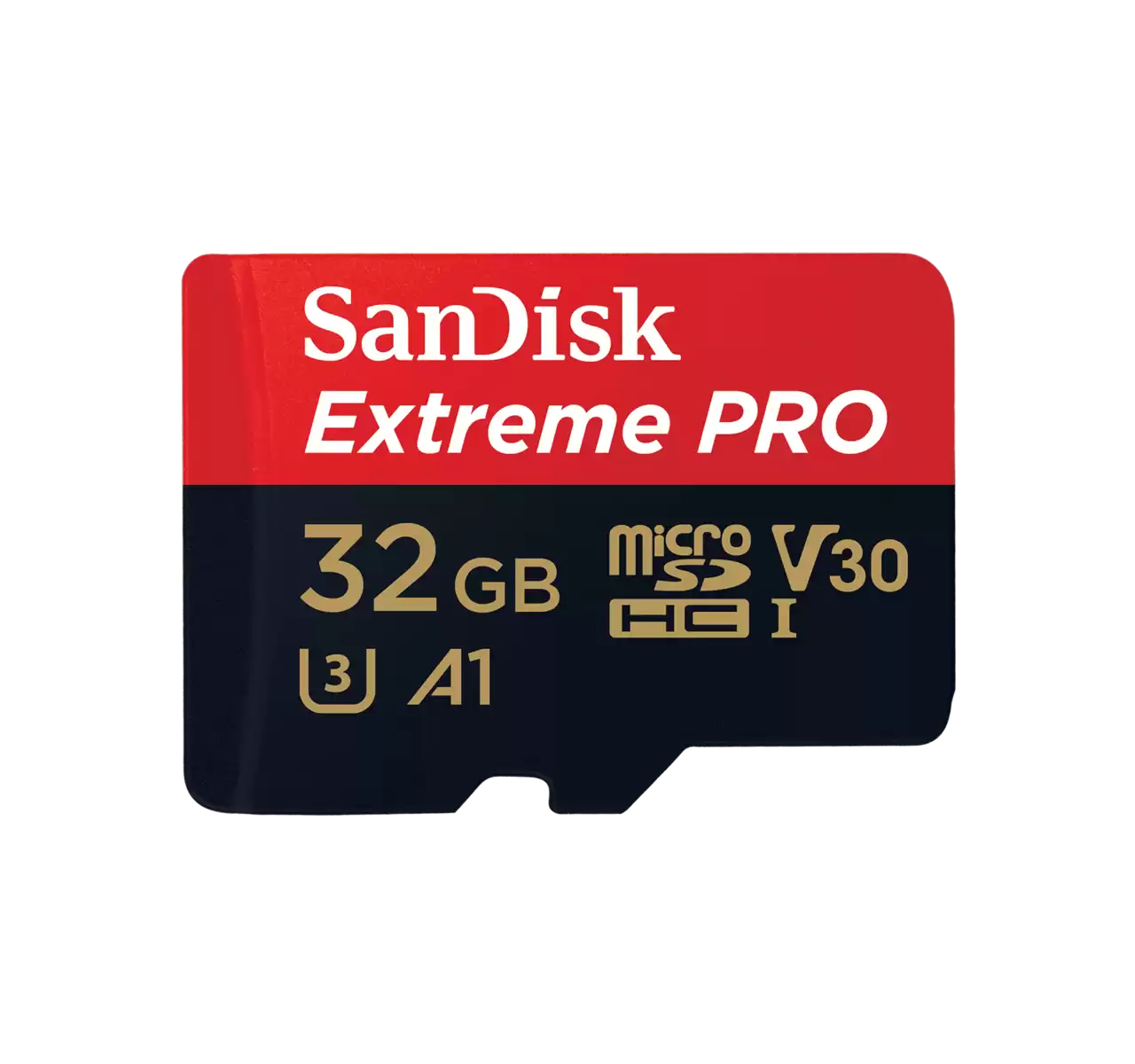- Advertised capacity: 32GB
- Logical capacity: 31,914,983,424 bytes
- Physical capacity: 31,914,983,424 bytes
- Fake/skimpy flash: Skimpy (0.27% skimp)
- Protected area: 83,886,080 bytes
- Adjusted skimp: 0.0035%
- Speed class markings: U3, V30, A1
- CID data:
- Manufacturer ID:
0x03* - OEM ID:
0x5344(ASCII:SD)* - Product name:
0x5350333247(ASCII:SP32G) - Product revision:
0x80
- Manufacturer ID:
* This manufacturer ID/OEM ID combination is pretty well known to be associated with SanDisk.
| Card # | 1 | 2 | 3 | Average |
|---|---|---|---|---|
| Obtained from | Amazon | AliExpress | AliExpress | N/A |
| Price paid | $12.63 | $8.55 | $8.55 | $9.91 |
| Serial number | 0x7a879790 | 0x8958014d | 0x87b80078 | N/A |
| Manufacture date | Jun 2023 | Mar 2023 | Mar 2023 | N/A |
| Sequential read speed (MB/sec) | 88.36 | 87.23 | 88.05 | 87.88 |
| Sequential write speed (MB/sec) | 54.35 | 53.93 | 53.69 | 53.99 |
| Random read speed (IOPS/sec) | 1,867.13 | 1,882.37 | 1,830.30 | 1,859.93 |
| Random write speed (IOPS/sec) | 424.56 | 442.15 | 430.39 | 432.37 |
| Read/write cycles to first error | 5,188 | 117 | 155 | 1,820 |
| Read/write cycles to complete failure | Not yet determined | Not yet determined | Not yet determined | Not yet determined |
| Total days to complete failure | Not yet determined | Not yet determined | Not yet determined | Not yet determined |
| Card reader used | JJS CR-UTC4AC | JJS CR-UTC4AC | JJS CR-UTC4AC | N/A |
| Package front | 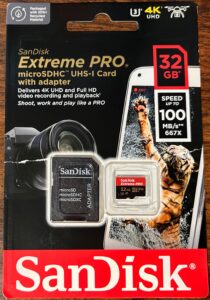 | 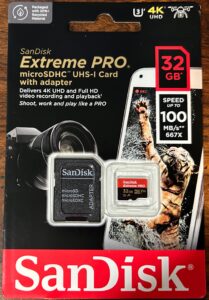 | 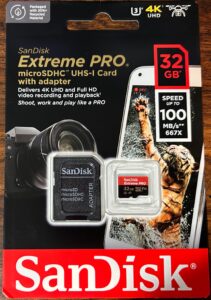 | N/A |
| Package back | 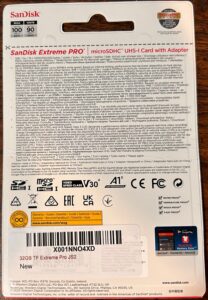 | 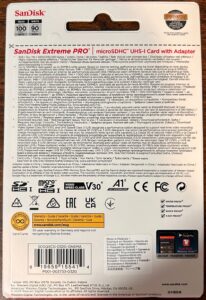 | 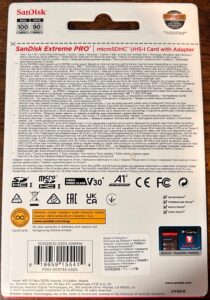 | N/A |
| Card front | 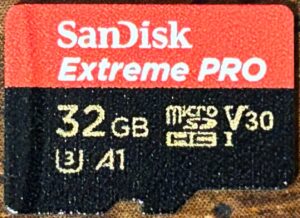 | 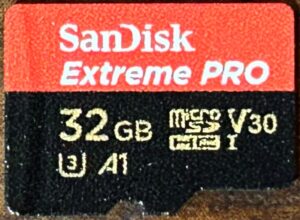 | 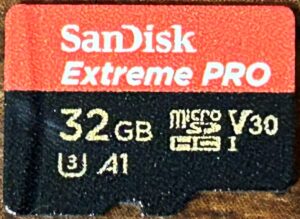 | N/A |
| Card back | 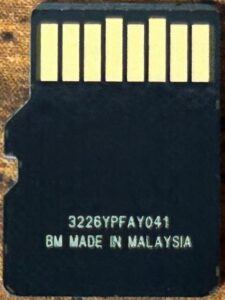 | 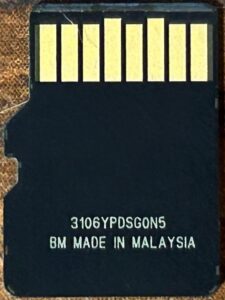 | 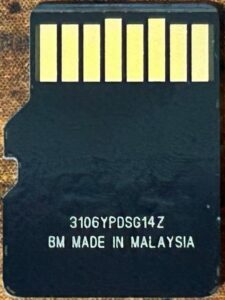 | N/A |
Discussion
In addition to the SanDisk Extremes, I wanted to test out some SanDisk Extreme PROs as well to see if there was any significant difference between the two.
Like the SanDisk Extreme 32GB, this card doesn’t make any extravagant speed claims — just “speeds” (it doesn’t specifically call out read or write speeds) of up to 100MB/sec. However, unlike the Extreme 32GB, I did not receive different models from Amazon vs. AliExpress — both versions had their product name set to SP32G. All performance metrics for all three samples were above average, with sequential write speeds — again, on all three samples — being more than one standard deviation above average. Sequential read/write speeds and random write speeds were slightly better than SM32G, although random read speeds were worse. Compared to the SN32Gs, however, read speeds (both sequential and random) were considerably worse, and write speeds (both sequential and random) were on par. Compared to the other name-brand cards that I tested, sequential read speeds were slightly below average, but all other metrics slightly better. Performance was good enough to merit the U3 and V30 marks; however, the A1 mark requires a write performance of at least 500 IOPS/sec, and all three samples fell a little short here. This is going to be another case where I’ll throw in my standard disclaimer: these cards may have done better here if they had been tested under proper conditions. They came close enough to the 500 IOPS/sec mark that this might actually be true.
Endurance tests for all three cards are still ongoing:
- Sample #1 did make it past the 2,000 read/write cycle mark without experiencing any errors; its first error was an eight-sector wide address decoding error during round 5,189. It has survived 6,484 read/write cycles in total so far.
- Sample #2 only survived 117 read/write cycles before experiencing an address decoding error. It has survived 5,849 read/write cycles so far.
- Sample #3 only survived 155 read/write cycles before also experiencing an address decoding error. It has survived 5,850 read/write cycles so far.
June 15, 2024 (current number of read/write cycles is updated automatically every hour)

